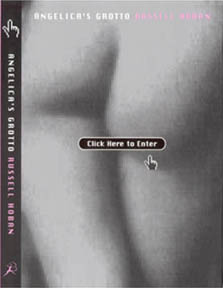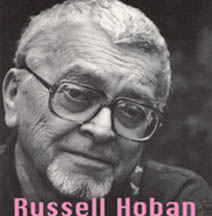 The original UK trade paperback from Bloomsbury. The text box, in case you can't make it out, says "Click Here to Enter." |
Angelica's Grotto
(1999)
A Novel by Russell Hoban
- Hooray! Angelica's Grotto was published in the US in June of 2001.
- Read Bloomsbury's original UK press release for Angelica's Grotto.
EDITIONS:
- (UK) Trade Paperback (First Edition) - Bloomsbury Publishing, Oct. 1999. 224 pp. £9.99. ISBN # 0-7475-4611-8
- NEW! (US) Hardcover (First Edition) - Carrol & Graf, June 2001. 288 pp. $25. ISBN #: 0786708786
AVAILABILITY
The US version is handily available these days at larger stores and discerning indies, and can be ordered from Amazon.com.The UK version can be ordered from Bloomsbury's own Web site (just search the title or "Russell Hoban"), or via Amazon UK.
 The US hardcover edition... A tad less Rabelaisian than Bloomsbury's cover, but striking nonetheless |
DESCRIPTION:
Here's the copy from the jacket:
Angelica's Grotto is a pornographic website into which seventy-two-year-old art historian Harold Klein wanders one evening. Klein, a walking catalogue of infirmities, known to medical consultants as 'he who declines to hop the twig,' may not be up to much physically but there's a lot of sex going on in his head. 'You're a tiger from the neck up, Professor,' says Melissa, the brains behind the website, when at last Klein faces the object of his desire.Harold first visits Angelica's Grotto after losing his 'inner voice', that censoring mechanism that keeps us from blurting out the first thing that pops into our heads and finding ourselves in Casualty as a result of it.
Harold consults a therapist about this new lack of mental privacy and also has one-to-one onscreen dialogue in the Grotto. 'If I had an inner voice I wouldn't be telling you all this,' he explains to the as-yet-unmet Melissa. But when the flesh-and-blood Melissa and her large and well-hung colleague Leslie enter his life he finds it's good to keep the angina medicine at the ready.
Harold Klein's odyssey takes him not only through erogenous zones but into various corners of the London art world, down the underground and up the buses. Russell Hoban has never been funnier, truer—or more eloquent.
 Photo by Mr. Hoban's sister Tana from the inside back cover |
NOTES
- Mr. Hoban's research for the novel included taking Rorshach and Bender tests on behalf of his protagonist.
- In the summer of 1998, during the period when he was working on Angelica's Grotto, Mr. Hoban went on a trip to Germany and brought back a hundred-year-old Meissen figure of a barefoot girl about to bowl a gold ball. (Meissen is a German city famous for fine porcelain.) The figure worked its way into the novel, crossing over metaphysically from Mr. Hoban's mantelpiece to Harold Klein's. See the excerpt below...and you can click here for a quick glimpse of the Meissen girl.
REVIEW QUOTES
"Brilliantly funny...wonderfully imagined...the story is furthermore studded (as it were) with wry observations that season the erotic detail with rich insight...superb fiction, and a powerful argument for making the complete oeuvre of this remarkable expatriate available in this country."—Kirkus Reviews (starred review)
"An intensely conceived coda to the verities of desire and fulfillment not to mention trust, honesty and pornography and Klein is a sharp, funny and intelligent protagonist whom readers will find it hard not to like."
—Publisher's Weekly
"An innately intelligent, highly original pondering of some of today's newly pressing problems of communication and interiority in a world committed to surfing, where 'intimacy' means one-on-one-on-line."
—Alan Stewart, Amazon UK
"When the noise of the psychobabble, art criticism and soft
and hard porn that Hoban has fun with in this novel has subsided, the
spectacle of Klein and his dialogue with death remains. Hoban's ability to
evoke a simultaneous yearning for life and the encroachment of a future
without form, language or sight is quite remarkable, whispering ceaselessly
at the edges of the novel while the reader is distracted with jokes and
baubles. To render the imminent end of consciousness and of subjectivity
amongst a series of narrative devices is an extraordinary act of creativity,
and confirms Hoban as an avatar of the strangeness of reality."
—Alex Clark, The Guardian
"Angelica's Grotto is sharp, funny, up-to-the minute, and raises
fascinating questions about male sexuality, the link between art and
pornography and the nature of the unconscious. The portrait of Klein is
beautifully observed...when he asserts that 'Being an old fool is the most fun I've had in a long time,' the reader can only concur."
—Michael Arditti, The Times
Every part of her was beautiful and shapely: her body and her limbs, her hands and feet, each individual finger and toe. Her long blonde hair framed the exquisite oval of her face. Full of sweetness, her face was, her rose-petal mouth all virginal, her eyes entranced and dreamy.
Her face was the face of the beloved who takes no notice, the beloved who passes by, chatting with her friends, with never a glance, never a thought for the one whose heart lies at her feet. Had Schott intended that face or was it that the very clay under his hands had refused him the response he craved?
Klein had bought that figure in Hannelore's home town, Celle in Lower Saxony. 'She looks like you,' he said to her.
'No, she doesn't,' said Hannelore. 'I was never that young, never that pretty.'
'Yes, you were, and the youth and prettiness are still there.'
'You wish.'
'I wish,' said Klein twenty years later as the girl, intent on her bowling, passed him by with never a glance.
The objects in his workroom, apart from their relationship with him, had relationships with one another: some harmless, some not. From a long-ago trip to Paxos with Hannelore, Klein, an inveterate collector of beach pebbles, had brought home one that he thought big enough to be called a stone. It appeared to be some kind of conglomerate, a pale warm grey, smoothly rounded, ovoid, weighed eighteen ounces, and felt good in the hand. On it Klein had written in black ink, in Greek letters, KINESIS/ANAPAUSIS: MOTION/REST.
Holding this stone in his hand, he saw the beach and the large mystical rocks shaped by the sea, heard the lapping of the tide and saw, magnified by the clear water, a polychaete worm, black and many-legged, like a warning to the curious. He saw the road to the villa and the olive trees on either side that flashed silver in the warm wind. There was a particular olive tree, ancient and wrinkled and still bearing fruit: in its hollow trunk was an opening that looked as if a naked goddess, Persephone perhaps, had emerged from it into the green-lit grove. Klein tried to remember the moment of balance when he had written those words on the stone, caught only the scent of Hannelore's sun-warm hair.
Sated with ANAPAUSIS, the Paxos stone longed for KINESIS. Klein had once placed it on the mantelpiece near the Meissen girl, then quickly removed it before it could jump up and smash her to bits. From then on he kept it on his desk, handling it as he would a dangerous pet.
Back to The Head of Orpheus: a Russell Hoban Reference Page (home page).
Russell Hoban's other novels and collections:
- The Mouse and His Child (1967)
- The Lion of Boaz-Jachin and Jachin-Boaz (1973)
- Kleinzeit (1974)
- Turtle Diary (1975)
- Riddley Walker (1980)
- Pilgermann (1983)
- The Medusa Frequency (1987)
- Fremder (1996)
- Mr Rinyo-Clacton's Offer (1998)
- Amaryllis Night and Day (2001)
- The Bat Tattoo (2002)
- The Moment Under the Moment (1992)
- A Russell Hoban Omnibus